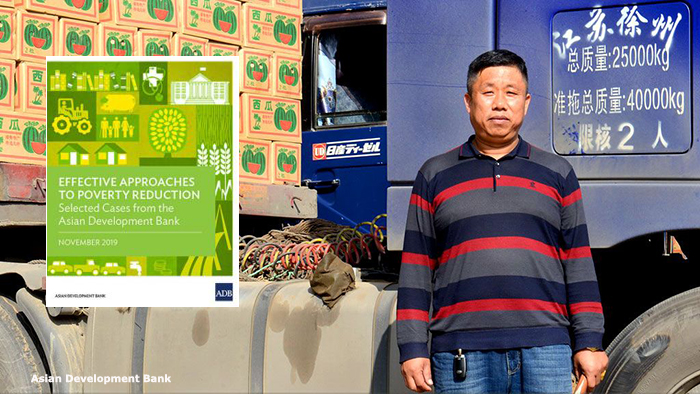Effective Approaches to Poverty Reduction: Selected Cases from the Asian Development Bank

Main photo: Growing business. Shan Zengquan, general manager of Hongfa Fruit Company Limited from Xuzhou city, Jiangsu Province, by Lu Jingwen via ADB. Inset: Publication cover.
This report [3]presents case studies of poverty reduction projects financed by the Asian Development Bank, including the Yunnan Integrated Road Network Development Project, which helped complete the national expressway system and constructed a highway from Kunming in the People’s Republic of China (PRC) to the Myanmar border.
The publication highlights projects that provided broader access to economic opportunities, promoted resilience, and empowered communities through improved governance. These projects were presented to the Global Solicitation and Challenge Prize on Best Poverty Reduction Practices [4], a global knowledge- sharing initiative that sought to collect 100 case studies of poverty reduction experiences and policies from the PRC and the international community.
About the Yunnan Integrated Road Network Development Project
The $250 million Yunnan Integrated Road Network Development Project [5]helped build the Longling–Ruili highway corridor (LRHC); rehabilitate local roads in Yunnan; establish maintenance groups for rural roads in Dehong Prefecture; and improve capacity of local road agencies. The project promoted ease in transit, reducing travel time from Longling to Ruili, a major crossing point on the border with Myanmar, from 4 hours to 2 hours, and improving percentage of non-tolled ordinary roads in good condition to 83% in 2015. Socioeconomic impacts have been significant: Yunnan’s road conditions improved and contributed to its strong output growth, living standards of the affected 29,859 people from 7,077 households improved, and welfare of ethnic minority communities also improved. The project also had a strong gender dimension, creating income-earning opportunities for poor women in rural areas. Women accounted for 38.5% of the local workforce for constructing the Longling–Ruili highway corridor, and 51.5% of the workforce for operation and maintenance of the expressway.
Last Updated: 6 December 2019
